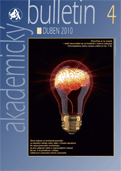New ERC project in the Institute of Physics of the Academy of Sciences

22 Sep 2014
Joerg Wunderlich from the Department of Spintronics and Nanoelectronics of the Institute of Physics CAS, with his colleagues from the UK and Germany, was awarded the prestigious ERC Synergy Grant for the project “Spin-charge conversion and spin caloritronics at hybrid organic-inorganic interfaces”. The project has started in August 2014 and will run till July 2020. Besides the Institute of Physics, the other participating organizations are the University of Cambridge, Hitachi Cambridge Laboratory, Imperial College in London, and the Johannes Gutenberg University in Mainz.
World premiere performance of the original version of Dvořák’s opera Alfred

16 Sep 2014
An extraordinary cultural event was held on 17th September 2014 as part of the music festival Dvořák’s Prague: The world premiere performance of Dvořák’s first opera, Alfred, was performed in the original version with German text. Despite the fact that Antonín Dvořák is one of the most well-known composers worldwide, many of his compositions are rarely performed. In case of this realisation of Alfred, more than dramaturgical decisions were required. Musicians, producers, and also musicologists have taken part in this ambitious project.
Unique interactive exhibition “60 Years of CERN” at the CAS

2 Sep 2014
The largest international research centre for particle physics, which operates the largest accelerator in the world, the LHC – is celebrating the 60th year since its foundation this year in September. Its official name is the “European Organization for Nuclear Research”, but it came into the awareness of the public rather under the acronym CERN (from French Conseil Européen pour la recherche nucléaire). The noteworthy interactive exhibition, is open to the public at no charge at the headquarters of the CAS from 2nd to 25th September 2014, on working days from 9 a.m. to 6 p.m.
The Prehistory of Bohemia in 7 volumes has been released

1 Sep 2014
Archaeological find of a church at Vyšehrad

20 Aug 2014
In July 2014, research of the Institute of Archaeology in Prague continued in the areas of the Basilica of St Lawrence at Vyšehrad. The research that has provided very interesting information in the area of early medieval sacral architecture was financially supported by the Magistrate of the Capital City of Prague, the royal collegiate chapter at Vyšehrad, Institute of Archaeology of the CAS in Prague, v. v. i., and the Prague Archaeological Fund. The systematic research of the Institute of Archaeology in Prague, which has been devoted to Vyšehrad in Prague for several decades now, continued this year.
Connecting the worlds of semiconductors and magnets

20 Aug 2014
Researchers from the Institute of Physics CAS realize an efficient spin-charge converter
Current information technologies are either charge-based or spin-based. Semiconductor microprocessors are prime examples among the large variety of charge-based devices. They utilize the possibility offered by semiconductors to easily electrically manipulate and detect their electronic charge states representing the zeros and ones. Spin-based devices operate on an entirely distinct principle.
Genetic blueprint of bread wheat genome unveiled

17 Jul 2014
Institute of Rock Mechanics and Structure CAS has become a Worldwide Centre of Excellence

14 Jul 2014
The scientific teams of the Academy of Sciences of the CR and Charles University have received significant awards for their results so far in long-term joint research of landslides. The Institute of Rock Mechanics and Structure (ÚSMH) of the CAS, v. v. i, along with the Faculty of Science of CU obtained the title of a Worldwide Centre of Excellence for Research of the Risks of Landslides in Beijing in June of this year.
The zebrafish as an aide in modern haematology

11 Jul 2014
A current trend of modern biomedical research is the attempt to minimalize experiments on animals like mice or chickens and where it is possible to replace them with developmentally simpler model organisms, but it is a necessary precondition that some basic cellular and physiological processes are evolutionarily conserved with these organisms, by which the similarity with the processes taking place in more complex organisms is preserved. One such biological model is the aquarium fish, the zebrafish, named for its zebra-like stripes.
Ultraviolet light enables to find white-nose syndrome in bats

4 Jun 2014





